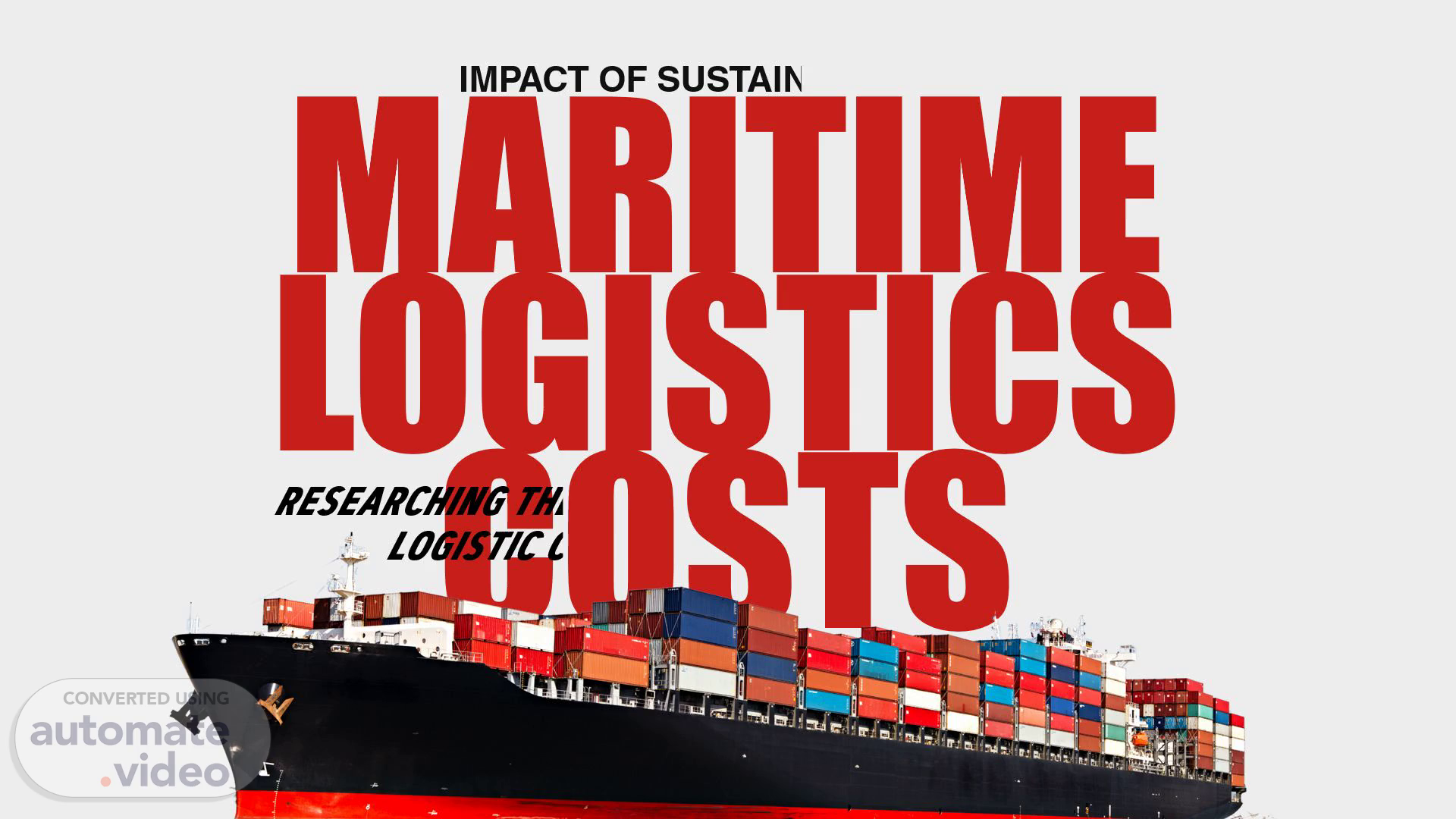Scene 1 (0s)
MARITIME LOGISTICS COSTS. IMPACT OF SUSTAINABILITY ON.
Scene 2 (9s)
FROM DOKUZ EYLUL UNIVERSITY FACULTY OF MARITIME/DEPARTMENT OF LOGISTICS MANAGEMENT İZMIR/TÜRKİYE.
Scene 3 (23s)
CHAPTER 1: RATIONALE BEHIND THE TOPIC SELECTION.
Scene 4 (30s)
MOTIVATION BEHIND THE RESEARCH TOPIC. Maritime shipping accounts for the majority of global trade volume, yet it is also a major CO₂ emitter. Regulatory frameworks such as the European Green Deal have made sustainability a strategic imperative. Understanding the cost implications of sustainable practices is essential for operational competitiveness..
Scene 5 (46s)
THE SECTOR FACES A GROWING DILEMMA. ‘’Balancing cost-efficiency with the increasing pressure to adopt sustainable practices.’’.
Scene 6 (56s)
Maritime transport is cost-effective and preferred for high-volume cargo, but it heavily relies on fossil fuels. The sector contributes significantly to global CO₂ emissions and faces increasing regulatory constraints. EU policies like the Green Deal aim to reduce carbon emissions, creating operational and financial pressure. This study focuses on the impact of environmental sustainability practices on maritime logistics costs..
Scene 7 (1m 15s)
LITERATURE PERSPECTIVE & RESEARCH GAP. Literature emphasizes the environmental impact of maritime transport, particularly focusing on CO₂ emissions and fossil fuel dependency. While several studies (e.g., Miola et al., 2009; Lähdeaho et al., 2020) examine sustainability in port operations and general shipping practices, they rarely establish a direct link between sustainability efforts and the financial structures of maritime logistics..
Scene 8 (1m 35s)
LITERATURE PERSPECTIVE & RESEARCH GAP. Addressing this gap, our study investigates the cost implications of green practices through a case study, focusing on how sustainability investments impact costs and financial performance in maritime logistics..
Scene 9 (1m 52s)
CHAPTER 2: METHODOLOGY AND RESEARCH FRAMEWORK.
Scene 10 (1m 59s)
INVESTIGATING MARITIME SUSTAINABIILITY: METHODS AND CASE SELECTION.
Scene 11 (2m 17s)
INTERVIEW. The interview questions were designed based on the study by Lähdeaho, Hilmola, & Kajatkari (2020), which examined sustainability practices at the HaminaKotka Port. Drawing inspiration from this structure, the question set was adapted to align with Arkas Line’s 2023 Sustainability Report..
Scene 12 (2m 32s)
The interview topics covered;. INTERVIEW. carbon emissions, fuel and energy costs, logistics expenses, sustainable supply chain practices, technological investments, and compliance with environmental regulations..
Scene 13 (2m 44s)
CHAPTER 3: CASE STUDY FINDINGS INTERVIEW INSIGHTS.
Scene 14 (2m 51s)
FINDINGS: THEMES AND STRUCTURE. This chapter presents the key findings obtained from the semi-structured interview conducted with Arkas Line, supported by the company’s 2023 Sustainability Report..
Scene 15 (3m 10s)
Covers low-sulfur fuels (VLSFO), biofuels, the impact of IMO 2020 regulations, cost comparisons, and operational trade-offs related to fuel strategy..
Scene 16 (3m 22s)
TECHNOLOGICAL. Focuses on scrubber systems, PBCF, digitalization (e.g., ARMA system), energy-efficient ship designs, and return-on-investment uncertainties..
Scene 17 (3m 35s)
CARBON EMISSIONS, REGULATORY PENALTIES, AND FINANCIAL INCENTIVES.
Scene 18 (3m 49s)
CHAPTER 4: DISCUSSION AND KEY CONCLUSIONS.
Scene 19 (3m 56s)
Maritime firms must choose between installing scrubbers or using low-sulfur fuels to comply with IMO 2020. While scrubbers offer long-term savings, their high investment cost (~$4–5M) and downtime make them risky for many operators..
Scene 20 (4m 17s)
INNOVATION VS. AFFORDABILITY. Sustainability-driven technologies (e.g., eco-design ships, digital fleet systems) improve efficiency but require substantial capital..
Scene 21 (4m 38s)
Global sustainability regulations, particularly in the EU, increase cost burdens through carbon taxes (e.g., ETS). However, access to compensation mechanisms like carbon credits and green loans is uneven..
Scene 22 (4m 59s)
CONCLUSIONS. Sustainability in shipping is no longer a choice—but the cost of staying in the game..
Scene 23 (5m 8s)
CONCLUSIONS. This study shows that while sustainability provides long-term strategic value for firms aiming to stay competitive, high upfront costs and uncertain return on investment make adoption difficult—especially outside the EU. Arkas Line’s preference for low-sulfur fuel over scrubbers reflects this dilemma: firms seek compliance with minimal disruption, even if it means delaying deeper transformation..
Scene 24 (5m 26s)
To ensure fair and effective adoption of sustainability in maritime logistics, financial accessibility must be improved globally. Policymakers should provide regionally adaptive incentives—such as green funds, low-interest loans, and tax benefits—to support firms facing high investment barriers.
Scene 25 (5m 40s)
This study contributes to the literature by addressing the financial dimensions of sustainability in maritime logistics, while also serving as a practical guideline for firms navigating the trade-off between environmental goals and cost pressures..
